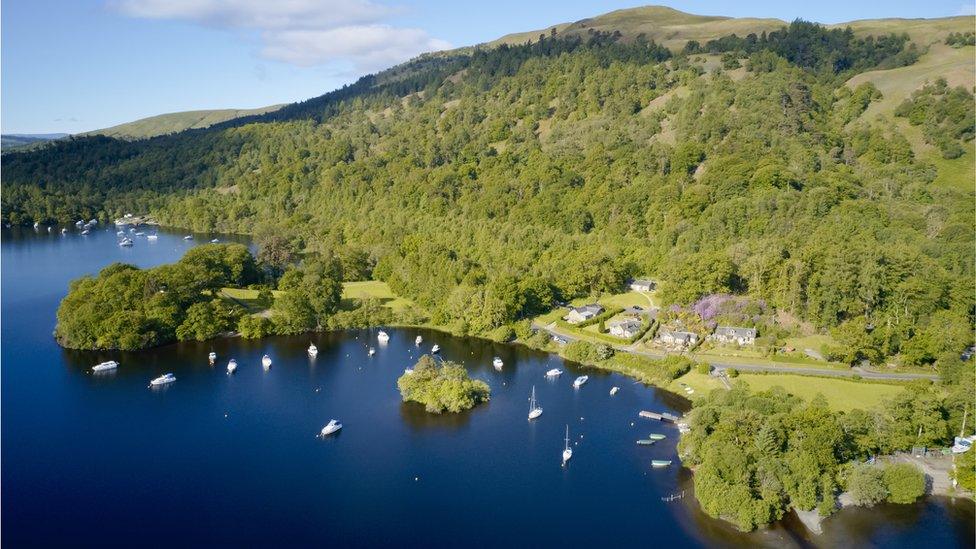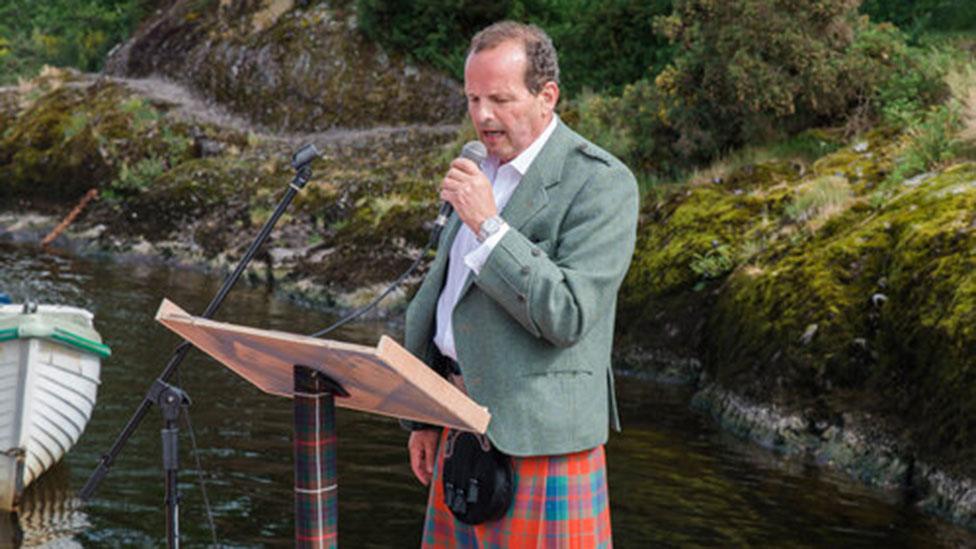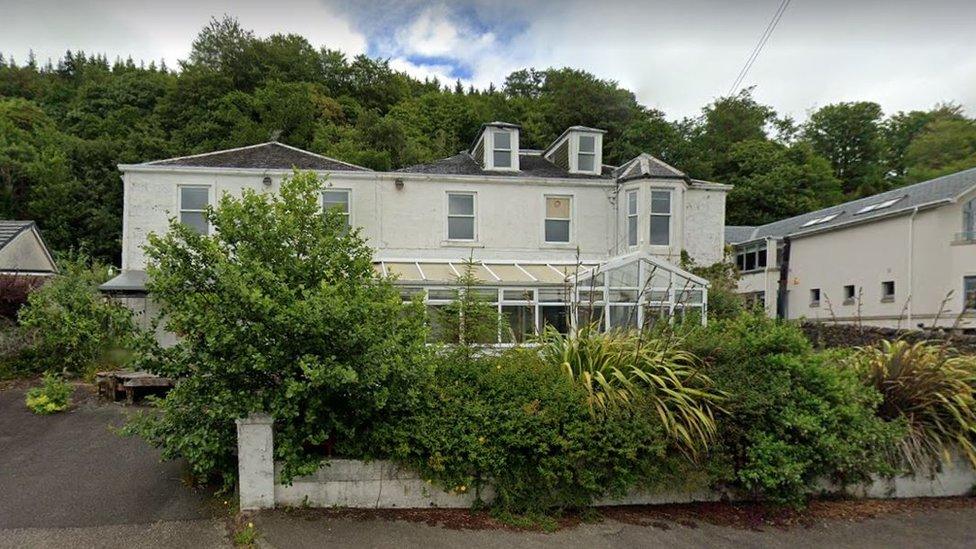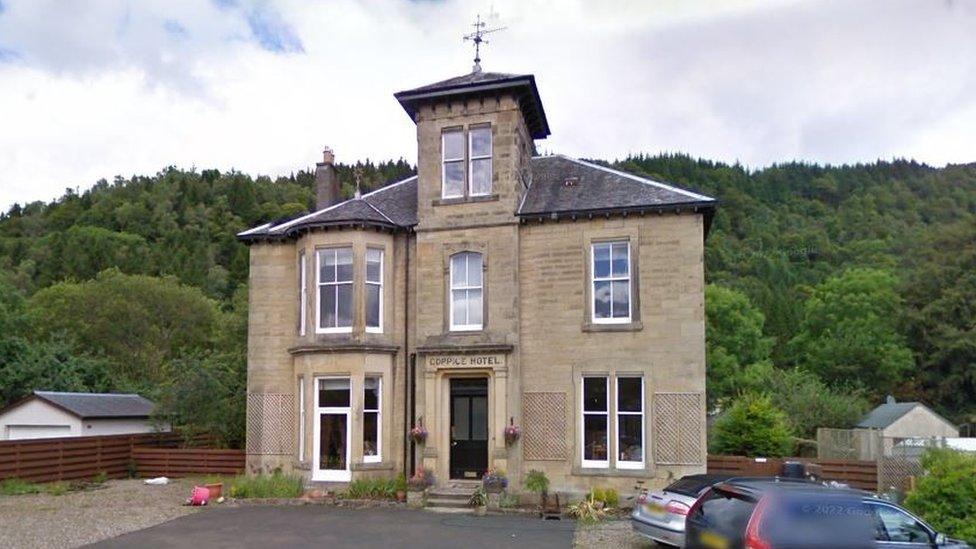Charity fears over loss of hotels in Loch Lomond and The Trossachs
- Published

The tourism industry supports 5,000 jobs in the Loch Lomond and The Trossachs national park
A conservation charity is raising concerns about the number of smaller hotels which are closing in the Loch Lomond and The Trossachs National Park.
They say more family-run hotels are being converted into homes for commuters and retired people.
Friends of Loch Lomond and The Trossachs fear the trend will create more commuter villages and reduce employment opportunities for locals.
The park authority says it reflects changes in the wider industry.
It said the hospitality and tourism industry was facing recruitment problems and a drop in international visitors since the pandemic.
The sector supports about 5,000 jobs among a population of 15,000 people in the park.
Friends of Loch Lomond and The Trossachs highlighted a number of recent applications made to the park authority requesting permission to change hotels' use.
They include:
The Coppice Hotel in Callander, Stirling, which wants to revert back to a residential property "as a result of Covid-19, increased living costs and a lack of staff".
The Pier Hotel in Kilmun, Argyll and Bute. Its owners say the hotel is derelict and have applied to change its use to four flats.
The new owner of The Lochearn Brewery Hotel in St Filans, Perthshire, wants to convert it into 22 serviced apartments for holiday use.
Earlier this year The Waverley Hotel in Callander, Stirling, was given permission to convert its second floor into two five-bedroom homes of multiple occupancy (HMOs), to cater for demand from seasonal workers in the agriculture and tourism industries.
And last year the park authority approved a request to convert the Coach House Hotel at Killin, Perthshire, into a dwelling house.

'Scottish tourism is going to be set back 40 years'

Sandy Fraser has run the Oak Tree Inn at Balmaha for 25 years.
Sandy Fraser, who owns the Oak Tree Inn at Balmaha, says he regrets persuading his children to join the hospitality industry.
"What a mess the industry is in through no fault of our own," he said.
As the cost of living increases, he has seen a reduction in the amount people are spending in his businesses, which employ about 140 people in the area.
"People are still coming out but they're staying outside and bringing a picnic and I don't blame them," he said.
"They're having one course, instead of two. They're spending less because they're worried. Or they're not spending at all because they've already spent on fuel."
But his costs are increasing. VAT and business rates are back up to pre-pandemic levels and his energy costs are double what they were last year.
He knows some businesses will close, while others will cut their hours in a bid to survive.
"The sector is going to go back 40 years. You won't be able to get a meal after 2pm because places will be shut. A lot of good work is going to be lost," he said.

Friends of Loch Lomond and The Trossachs said a "raft of hotels" had been lost recently, due to the impact of Covid, increased running costs and staffing difficulties.
Chairman James Fraser told BBC Scotland that in villages near Stirling, Glasgow and Edinburgh, the new homes would be bought up by commuters.
In other areas they are in high demand for people who have retired.
"It is very disappointing to see the scale of loss of family run hotels in the national park in recent times, but this is inevitable given the major challenges and pressures faced by owners in such a difficult trading environment," he said.
"With the loss of smaller hotels and the retrenchment of some of the larger hotel operations some of the tourist appeal of the national park is being diluted.
"There is a real danger of more communities becoming dormitory commuter and retirement retreats and lacking in the diversity and vibrancy derived from having a blend of enterprises locally with employment opportunities."

Plans have been drawn up to convert the former Pier Hotel in Kilmun into four flats

The owners of the Copice Hotel want to revert to a residential property
He said he expected the national park's new five year plan would major on climate and nature emergencies, but he added: "It is also vitally important that they also try and tackle the people dimension to reverse the drift towards creating more dormitory towns and villages.
Stuart Mearns, director of place at Loch Lomond & The Trossachs National Park Authority, said the trend was reflective of the wider tourism industry in Scotland.
"Outwith a small number of accommodation businesses which have this year returned to purely residential use, or are seeking to, we have not seen a significant number of hotels closing and shifting to permanent residential use," he said.
"We continue to receive regular applications for new accommodation. Overall, the decrease in some types of accommodation needs to be viewed with a broader view that includes new accommodation, particularly non-serviced accommodation, which is in growing demand."
Mr Mearns added the industry has had to respond to "multiple challenges" such as recruitment and a significant post-pandemic drop in international tourism.
He said: "This has been set against changes in the market over time - notably a shift towards self-catering accommodation.
"The challenges and trends being felt by tourism businesses here in the national park are the same current national issues being highlighted by hotels, restaurants and other industry operators across Scotland."